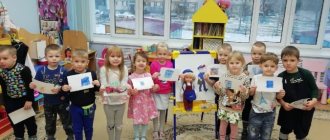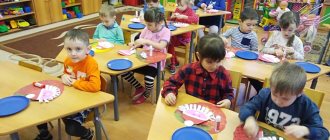Cognitive development in kindergarten
This section of the site contains developments on the cognitive development of children in kindergarten. Cognitive development is a set of quantitative and qualitative changes that occur in cognitive mental processes due to age, under the influence of the environment and the child’s own experience.
Cognitive development involves the cognitive activity of a preschooler. And in order to support cognitive activity, it is necessary to rely on the cognitive interest of children. Cognitive interest is a selective focus on the knowledge of objects, phenomena, events of the surrounding world, activating the mental processes and activities of a person, his cognitive capabilities.
The cognitive development of preschool children is based on cognitive activity, as a result of which the child’s personal experience is formed, his value attitude to the world, and the needs for knowledge and cognition are formed. Through cognitive processes, the child receives and comprehends information. Sensation, perception, thinking, imagination, speech are inseparable parts of a single process of reflecting reality. Sensual visual knowledge of objects and phenomena of the surrounding world creates the initial basis for the formation of the personality of a preschool child.
In the section of the site, cognition, cognitive development in kindergarten contains many interesting activities for educators on teaching children on various topics:
- Educational situation on cognitive and speech development of children in kindergarten
- Open lesson on self-knowledge in a preschool classroom
- Cognition lesson at a preschool educational institution “Let’s Help the Hedgehog”, junior group
- Summary of educational activities with preschool children cognitive development FEMP
- Summary of direct educational activities on cognition, communication and artistic creativity in the senior group “Spring, primroses”
- Summary of direct educational activities educational area “Cognition” on the topic “Water Sorceress” senior group
- Summary of educational activities on cognitive development in kindergarten on the topic “KVN whychek” with children of the preparatory group
- Summary of the open final lesson on cognitive and speech development in the senior group on the topic “Travel with the Sprinkler”
- Summary of educational activities with children in the middle group of kindergarten
- Abstract of GCD in kindergarten cognitive development
- Summary of a lesson on cognitive development in junior group 1
- Summary of organized educational activities in the educational field “Cognitive Development” (FEMP)
- Notes in kindergarten “My Small Motherland” Educational activities of children in the preparatory group cognitive development
- Summary of educational activities “Wonderful Tree” in the field of cognition for children of the second junior group
- Technological map of organized educational activities for children of the middle group educational area “Cognition” section Ecology topic Electrical appliances
- Abstract of the educational activity “Journey to the world of living nature” Educational area Cognitive development
- Summary of a lesson in kindergarten on cognitive development in the senior group
- Summary of organized educational activities on cognitive development in the senior group for children with mental retardation “On the Seabed”
- Lesson on developing the cognitive sphere and creative abilities of older children with mental retardation “Visiting a fairy tale”
- Summary of direct educational activities on cognitive development with children of the preparatory group Russia is my Motherland!
- Cognitive activities in kindergarten
- A feature of a child’s healthy psyche is cognitive activity.
The condition that promotes the development of cognitive activity of pupils is the creation of a favorable psychological microclimate in the children's team, trusting relationships between all participants in the educational process.
One of the most important abilities is the ability to cognition. Cognitive development of children is one of the important areas in working with preschool children. A child is born with an innate cognitive orientation that helps him adapt to new conditions of his life. By the end of his stay in kindergarten, we must help the child master basic concepts in the field of natural science, mathematics, and history. To teach, based on one’s own knowledge, to make independent decisions in different types of activities.
Preschoolers' knowledge of the world occurs mainly through emotional and practical means. Children pay attention to everything unusual, bright, and what they directly encounter. What knowledge about the world should be acquired in preschool age? The surrounding world can be divided into social (people, emotions, relationships), natural (peculiarities of the season, weather phenomena, flora and fauna) and objective (materials and their properties, transformations of objects). Children of primary preschool age (3-4 years old) are mainly interested in objects from their immediate environment, which they can study directly (at home, in kindergarten, on a walk).
A child’s curiosity is constantly aimed at understanding the world around him and building his own picture of this world. The child, while playing, experiments, tries to establish cause-and-effect relationships and dependencies. He himself, for example, can find out which objects will sink and which will float. He has many questions about the phenomena of life around him. The more mentally active a child is, the more questions he asks and the more varied these questions are.
Thanks to the subject Self-Knowledge, which is taught in kindergarten, it makes it possible to more fully solve the problems of the consistent formation of a child’s personality, to reveal and enrich his inner world, and to carry out corrective knowledge of himself and another person.
Design of a cognitive zone in a kindergarten. In the younger group, the children's area is designed taking into account safety rules. When performing active movements, babies lack the coordination of the child. Formation of actions aimed at understanding the surrounding world, development of conscious activity. Development of creative abilities and imagination.
To do this, kindergarten uses all kinds of entertaining tasks, experimental activities, observation, encourages learning through didactic games, etc. Children take a personal part in all these processes, which gives the best result. Methods of cognitive development in preschool educational institutions make it possible to improve such important areas for a child as curiosity, thinking, imagination, memory, logic, and speech.
Through cognitive processes, the child receives and comprehends information. Sensation, perception, thinking, imagination, speech are inseparable parts of a single process of reflecting reality. Sensual visual knowledge of objects and phenomena of the surrounding world creates the initial basis for the formation of the personality of a preschool child.
Lesson notes on cognitive development
Summary of a lesson on cognitive development in the middle group.
"Journey to the Mathematical Kingdom"
Target :
Consolidation of elementary mathematical concepts.
Tasks:
Educational. Fix the ordinal count within 5.
The ability to recognize geometric shapes and name them. The relationship between numbers and quantities.
Developmental: Ability to answer questions clearly and quickly. Create conditions for the development of logical thinking, intelligence, and attention.
To foster friendly relationships between children and interest in mathematical studies.
Equipment: TV, tape recorder, numbers, handouts, geometric shapes, sets of Dienesh blocks.
Progress of the lesson:
Guys, I'm very glad to see you all. Let's stand together in a circle and hold hands.
- I am your friend, and you are my friend. Let's hold hands tightly and smile at each other.
- Now look at our guests and give them a smile. Great.
-Today I want to invite you on a journey to the mathematical kingdom.
- Do you agree ? Do you like completing tasks? Then let's begin.
-To get to the land of mathematics you need to think and say what you already know. It's not so easy to get to the first task. You need to crawl through the magical corridor.
(Children go through the “tunnel” and find themselves near the table.)
-So, the first task. There are numbers hidden in our group, we must find them and put them on the table.
(Children begin to look for numbers, name them and lay them out on the table.)
- Well done, you have collected all the numbers, come closer to the table. I suggest laying them out in order and counting them together. (Children lay out the numbers 1-2-3-4-5.) Then take turns counting to 5.
-We continue our journey. There are magical tracks in front of you, we will follow them to the next task. We all follow the steps to the TV.
-Guys, look carefully at the screen and name what is shown there.
-on the slides we show a circle, square, rectangle, triangle, oval.
Children name geometric shapes.
- Smart girls, you have completed the next task. I suggest you get some rest.
is being held .
We nod our heads. which number I call (2), I show the number 2.
We perform tilts, whichever number I call (1).
We clap our hands as many times as I’ll show you now (3).
We will sit down as many times as I’ll name now (4).
Let’s stamp our foot as many times as I’ll show you now (5).
- Amazing . Shall we continue completing tasks?
-The Queen of Mathematics has a beautiful palace. And you and I will build our own houses. This will be the last task. I invite you to come to the table, sit down comfortably, look at the pictures, they will help you complete the construction. There are also blocks prepared for you from which you can build houses. We carefully examine the samples and get to work.


